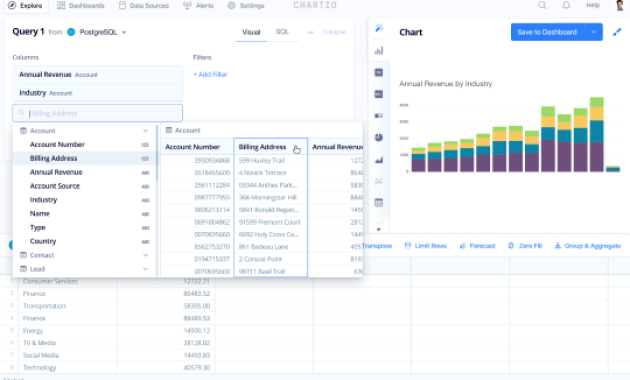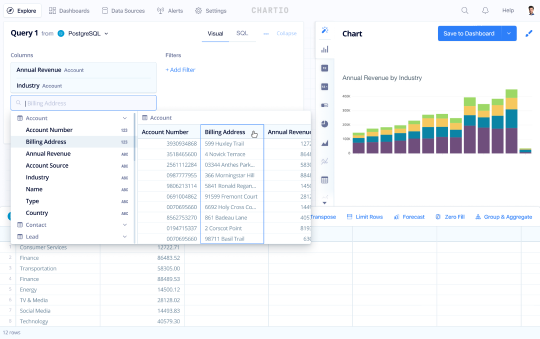
Business Intelligence Tools That Are Revolutionizing Data-Driven Decision Making
In today’s fast-paced business landscape, the ability to make informed decisions quickly is no longer a luxury; it’s a necessity. Companies are drowning in data, but without the right tools, that data remains untapped potential. This is where business intelligence (BI) tools come into play. These powerful software applications transform raw data into actionable insights, enabling organizations to optimize operations, identify new opportunities, and gain a competitive edge. This article explores the transformative impact of business intelligence tools and the key features to look for when selecting the right solution.
Understanding the Power of Business Intelligence
Business intelligence tools are designed to collect, process, analyze, and visualize data from various sources. This allows businesses to gain a comprehensive understanding of their performance, market trends, and customer behavior. By providing a clear and concise view of complex data, BI tools empower users to make data-driven decisions with confidence. They bridge the gap between raw data and actionable insights, transforming information into a strategic asset.
The benefits of implementing business intelligence tools are manifold. They include:
- Improved Decision-Making: Access to real-time data and insightful analytics allows for more informed and strategic decisions.
- Increased Efficiency: Automation of data analysis and reporting streamlines workflows and saves valuable time.
- Enhanced Customer Understanding: Analyzing customer data provides valuable insights into their preferences and behaviors.
- Competitive Advantage: Identifying trends and opportunities allows businesses to stay ahead of the curve.
- Cost Reduction: Optimization of processes and resource allocation leads to significant cost savings.
Key Features to Look for in Business Intelligence Tools
Choosing the right business intelligence tool is crucial for success. The optimal solution will align with your specific business needs and data infrastructure. Here are some essential features to consider:
Data Integration and Connectivity
A robust BI tool should be able to connect to a wide range of data sources, including databases, spreadsheets, cloud services, and CRM systems. Seamless data integration is essential for consolidating data from different sources into a unified view. The best business intelligence tools offer pre-built connectors for popular data sources and the ability to create custom integrations.
Data Visualization and Reporting
Effective data visualization is key to understanding complex data. Look for tools that offer a variety of charts, graphs, and dashboards to present data in a clear and intuitive manner. Customizable reports and dashboards should be readily available, allowing users to tailor the information to their specific needs. Powerful reporting capabilities are at the core of what business intelligence tools offer.
Data Analysis and Modeling
Beyond visualization, business intelligence tools should provide advanced analytical capabilities. These include data mining, statistical analysis, predictive modeling, and what-if analysis. These features enable users to uncover hidden patterns, predict future trends, and make more informed decisions. The ability to perform ad-hoc analysis and explore data interactively is also crucial.
User-Friendliness and Accessibility
A user-friendly interface is essential for widespread adoption. The tool should be easy to learn and use, with intuitive navigation and drag-and-drop functionality. Accessibility across different devices (desktop, mobile, tablet) is also important, ensuring that users can access data and insights from anywhere, anytime. The ease of use is what makes business intelligence tools so effective.
Collaboration and Sharing
Collaboration features enable teams to work together on data analysis and reporting. Look for tools that allow users to share dashboards, reports, and insights with colleagues. Features like commenting, annotation, and version control can enhance collaboration and improve decision-making. Sharing insights is a core benefit of using business intelligence tools.
Scalability and Performance
As your business grows, your data volume will likely increase. The business intelligence tool you choose should be able to scale to accommodate this growth. Consider the tool’s performance, including its ability to handle large datasets and provide fast query response times. Scalability is critical for long-term success with business intelligence tools.
Security and Governance
Data security is paramount. Ensure that the business intelligence tool offers robust security features, including data encryption, access controls, and audit trails. Compliance with relevant data privacy regulations is also essential. Data governance features, such as data lineage and metadata management, help ensure data quality and consistency.
Popular Business Intelligence Tools on the Market
Several leading business intelligence tools are available, each with its strengths and weaknesses. The best choice for your business will depend on your specific needs and budget.
Tableau
Tableau is a widely used and highly regarded BI tool known for its powerful data visualization capabilities and user-friendly interface. It offers a wide range of features, including data blending, advanced analytics, and mobile access. Tableau is a good choice for businesses that prioritize data visualization and ease of use.
Microsoft Power BI
Microsoft Power BI is a popular and cost-effective BI tool that integrates seamlessly with other Microsoft products. It offers a comprehensive set of features, including data modeling, data transformation, and interactive dashboards. Power BI is a good choice for businesses that already use Microsoft products and want a powerful, affordable BI solution.
Qlik Sense
Qlik Sense is a self-service BI tool that uses an associative data model to provide users with a flexible and intuitive way to explore data. It offers a wide range of features, including data discovery, data storytelling, and mobile access. Qlik Sense is a good choice for businesses that want a flexible and user-friendly BI tool.
Looker
Looker is a modern BI platform that focuses on data governance and collaboration. It offers a powerful data modeling layer that allows users to define and reuse business metrics. Looker is a good choice for businesses that prioritize data governance and want a BI tool that can be used across the organization.
Implementing Business Intelligence Tools: A Step-by-Step Guide
Successfully implementing a business intelligence tool requires a well-defined strategy and a clear understanding of your business needs. Here’s a step-by-step guide to help you get started:
- Define Your Objectives: Clearly identify your business goals and the specific questions you want to answer with data.
- Assess Your Data Sources: Identify the data sources you need to connect to and assess the quality and completeness of your data.
- Choose the Right Tool: Evaluate different business intelligence tools based on your needs, budget, and technical expertise.
- Plan Your Implementation: Develop a detailed implementation plan that includes data integration, data modeling, and dashboard design.
- Train Your Users: Provide adequate training to your users to ensure they can effectively use the tool.
- Monitor and Refine: Continuously monitor the performance of your BI tool and make adjustments as needed.
Future Trends in Business Intelligence Tools
The field of business intelligence is constantly evolving. Several trends are shaping the future of BI tools, including:
- Artificial Intelligence (AI) and Machine Learning (ML): AI and ML are being integrated into BI tools to automate data analysis, predict future trends, and provide more personalized insights.
- Data Democratization: BI tools are becoming more accessible to non-technical users, empowering them to analyze data and make informed decisions.
- Cloud-Based BI: Cloud-based BI tools are becoming increasingly popular due to their scalability, flexibility, and cost-effectiveness.
- Data Governance and Privacy: With growing concerns about data privacy, BI tools are incorporating more robust data governance and security features.
- Embedded Analytics: BI tools are being embedded into other applications, allowing users to access data and insights within their existing workflows.
The future of business intelligence is bright, with continued innovation and advancements that will transform how businesses make decisions. As the volume of data grows, the need for powerful and user-friendly BI tools will only increase. [See also: The Importance of Data Visualization in Business Intelligence]
Conclusion: Embracing the Power of Business Intelligence
Business intelligence tools are essential for businesses that want to thrive in today’s data-driven world. By providing access to actionable insights, BI tools empower organizations to make more informed decisions, optimize operations, and gain a competitive advantage. Choosing the right business intelligence tool and implementing it effectively can be a game-changer for your business. Embrace the power of business intelligence and unlock the full potential of your data. [See also: How to Choose the Right Business Intelligence Tool for Your Business]

